Personalized Product Recommendation System
Building an intelligent engine to understand customer behavior and suggest products they'll love, boosting sales and engagement.

The Business Challenge
In a crowded online marketplace, helping customers discover products they want is key to success. A generic, one-size-fits-all storefront can lead to lost sales and customer frustration. The challenge was to move beyond simple "best-seller" lists and create a truly personal shopping experience.
The mission was to build a smart recommendation system that learns from customer purchase history (implicit feedback). By understanding which products are frequently bought together, the system can make intelligent suggestions, helping customers find relevant items, increasing the average order value, and fostering customer loyalty.
My Development Process
Data Preparation & Feature Engineering
I began with a large e-commerce dataset, which was cleaned and processed to focus on successful purchases. The core of this step was creating a user-item interaction matrix from the purchase history, which was then converted into a sparse matrix for efficient model training.
Building the Recommendation Model
I used the `implicit` library to implement the **Alternating Least Squares (ALS)** algorithm. This collaborative filtering method is highly effective for large datasets with implicit feedback (like purchases), as it uncovers latent factors that explain user-product relationships.
API Development
To serve the model's predictions, I developed a REST API using **FastAPI**. This modern, high-performance framework exposes endpoints for both single-user recommendations and bulk simulations, making the model's intelligence accessible to other applications.
Frontend Integration & Testing
Finally, I built an interactive web interface using HTML and JavaScript. This frontend serves as a live demo, allowing anyone to input a user's purchase history and instantly see the personalized recommendations generated by the backend model.
Key Information
- Type: E-Commerce
- Tools: Python, FastAPI
- Model: ALS Algorithm
Technology Stack
- Python
- FastAPI (API)
- Implicit Library
- Pandas & SciPy
- HTML & JavaScript
Key Features
- Business Focus: Aims to increase average order value through cross-selling.
- Business Focus: Enhances user experience with personalized product discovery.
- Technical: Deploys a machine learning model via a scalable FastAPI backend.
- Technical: Full-stack implementation from data modeling to a live frontend demo.
Model Performance & Business Impact
The model was evaluated on its ability to rank relevant items highly for users. The results confirm that the ALS model provides meaningful recommendations that directly translate to positive business outcomes.
Increased Average Order Value
By suggesting relevant add-on items, the system encourages customers to purchase more in a single transaction.
Higher Conversion Rates
Personalized recommendations help users find what they're looking for faster, reducing bounce rates and increasing the likelihood of a sale.
Improved Customer Loyalty
A shopping experience that understands the customer's needs and preferences encourages repeat business and builds brand loyalty.